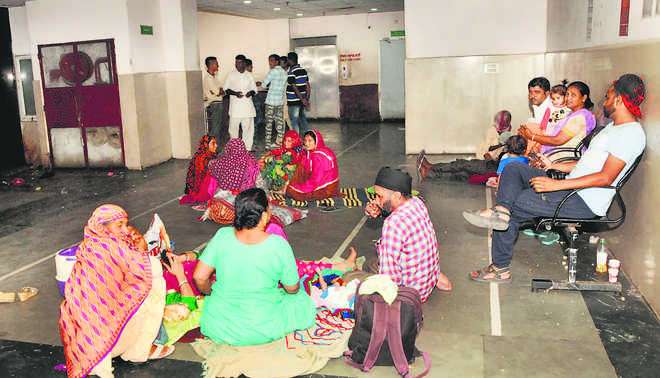Dr Burnout
Manmeet Singh Gill in Amritsar
What if you accompany a pregnant woman to a healthcare centre and are told that the gynaecologist assisting in delivery has not slept for the last 36-48 hours? You probably wouldn’t opt for the service. In many medical colleges, the on-duty post-graduate student-cum-junior resident doctors (JRs) seem a victim of a burnout syndrome.
Recently four PG students at the gynaecology department of Government Medical College in Amritsar left their coveted courses midway as they could not handle the tough duty hours. The JRs at the medical college, especially in the gynaecology and paediatrics departments, complain that they have to work for long hours to meet the patient rush. In departments such as medicine, orthopaedics and a few others, the duty hours are longer, but less than in gynaecology and paediatrics sections. A 24-hour duty is considered normal for the JRs.
GMC Principal Dr Sujata Sharma says the college follows the same rules as elsewhere. She said the students who left midway had their “personal reasons.”
Dr Arvind Sharma, registrar, Baba Farid University of Health Sciences (BFUHS), to which GMC Amritsar and other medical colleges in state are affiliated, says he cannot comment on the issue without having a look at the Supreme Court guidelines. He was not forthcoming on whether the university has its own guidelines to regulate the working hours of junior residents?
Central Residency Scheme guidelines circulated by the Union health ministry in 1993, following the 1988 instructions of the Supreme Court, state that junior resident doctors cannot be subjected to a maximum of 48-hour duty in a week. Also, single-stretch duty cannot exceed a maximum of 12 hours. At GMC gynaecology department in Amritsar, 54-hour or more duty stretch is common, say hospital sources.
Studies on causes of sleep deprivation conducted worldwide clearly say it adversely affects cognitive and psychomotor skills and causes serious performance deficiency. A few of these studies point out that sleep deprivation, more or less, causes the same level of psychomotor dysfunction as caused by alcohol consumption.
Though no such study has been conducted at the local level, Dr Savinder Singh, in-charge of the government-run premier Dr Vidya Sagar Institute of Mental Health said: “Staying awake for long duration could result in weakness, irritability, a fall in work potential, fatigue and other physical and mental issues.”
These signs are fairly visible among junior doctors. The patients often accuse these doctors of being rude and indifferent. This has often led to manhandling of JRs. In a recent visit to the labour room at GMC, a JR was reportedly heard telling the female patient’s attendant: “This child too would die for sure if you did not bring the gloves (surgical) in time.” The woman had last year lost a grandson. Given the circumstances, the JRs do not have the time for being polite. A former gynaecologist with the health department and patron of Punjab Civil Medical Services Association, Dr RS Buttar, admits junior resident doctors are often rude. “What would anybody do if he or she has not slept for 24-36 hours?”
Dr Buttar suggested that the government should hire house surgeons to ease the load on junior doctors. “The students must not be subjected to independent duties unless a senior and trained expert is present. The purpose of junior residency is to train future specialists under the guidance of trained doctors, he said.
The JRs are the ground staff in government facilities. The senior faculty takes one or two rounds of their respective wards daily. The seniors attend the OPDs, classes and are on-call duty in complicated cases. Around-the-clock availability of JRs makes them the face of public health services. Therefore, they have to bear with public ire even for a shortage of medicines and surgical supplies.
Dr Neeraj Nagpal of Medicos’ Legal Action Group (MLAG), which is all set to move the SC against the treatment of JRs, said on May 7, a student at King George Medical University Lucknow tried to commit suicide due to stress caused by work overload. The MLAG has recently procured duty rosters from 57 government-run medical colleges across the country.









